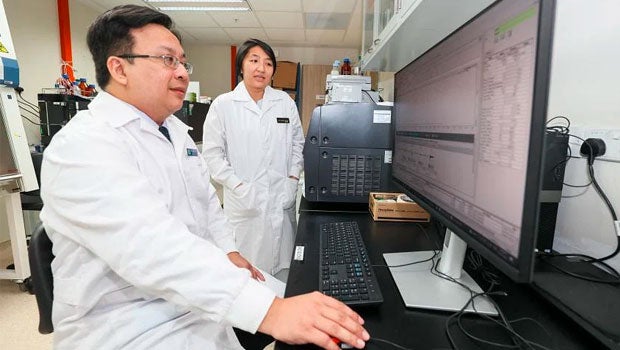SingHealth Duke-NUS Academic Medical Centre will NEVER ask you to transfer money over a call. If in doubt, call the 24/7 ScamShield helpline at 1799, or visit the ScamShield website at www.scamshield.gov.sg.

Dr Lim Tze Peng (left), who leads the SGH team that developed the test, and Dr Jasmine Chung, who is involved in a larger study as the next step. PHOTO: LIANHE ZAOBAO
SINGAPORE – A team from the Singapore General Hospital (SGH) has developed a test for 10 commonly prescribed antibiotics in intensive care units (ICUs), which allows clinicians to monitor the antibiotic levels in critically ill patients and adjust the doses to suit each of them.
This test, or therapeutic drug monitoring tool, is expected to benefit patients in the ICU with severe bacterial infections. Such patients often require continual adjustments of antibiotic doses to stabilise their condition.
The tool could also benefit critically ill patients who are on dialysis, as dialysis removes antibiotics from their blood.
The SGH team, led by Dr Lim Tze Peng, senior principal pharmacist researcher at the hospital’s pharmacy department, has just tested the tool on about 80 patients. The next step is a study involving 700 patients from January 2023 to look at the impact and outcome of monitoring antibiotic concentration using this tool, he said.
Dr Jasmine Chung, a senior consultant at the infectious diseases department at SGH who is involved in the larger study, said many doctors administer antibiotics based on standard dosing, as per evidence-based guidelines.
“However, doctors have come to realise that even if they use standard dosing, the doses are not sufficient to treat the hard-to-treat infections,” she said.
To personalise the dosing of commonly used antibiotics in the ICU, such as beta-lactam antibiotics, doctors will first need to know the level of antibiotic concentration in a patient’s blood.
Currently, the various tests for this purpose are few and rare, and available only at selected research or medical centres, said Dr Chung.
She said inappropriate dosing and duration of antibiotic treatment contribute to antimicrobial resistance or AMR, which occurs when pathogens like bacteria and fungi develop the ability to defeat the drugs designed to kill them.
Resistant infections are hard to treat, and AMR is growing around the world. “If I can dose right, the time to recovery from the infection, and the duration of antibiotics, is potentially shorter; and this is part of the strategy to combat AMR,” said Dr Chung.
Dr Lim said the long-term aim is to develop a test kit for commercialisation, so it can be used by other laboratories in Singapore and elsewhere.
© 2025 SingHealth Group. All Rights Reserved.















































